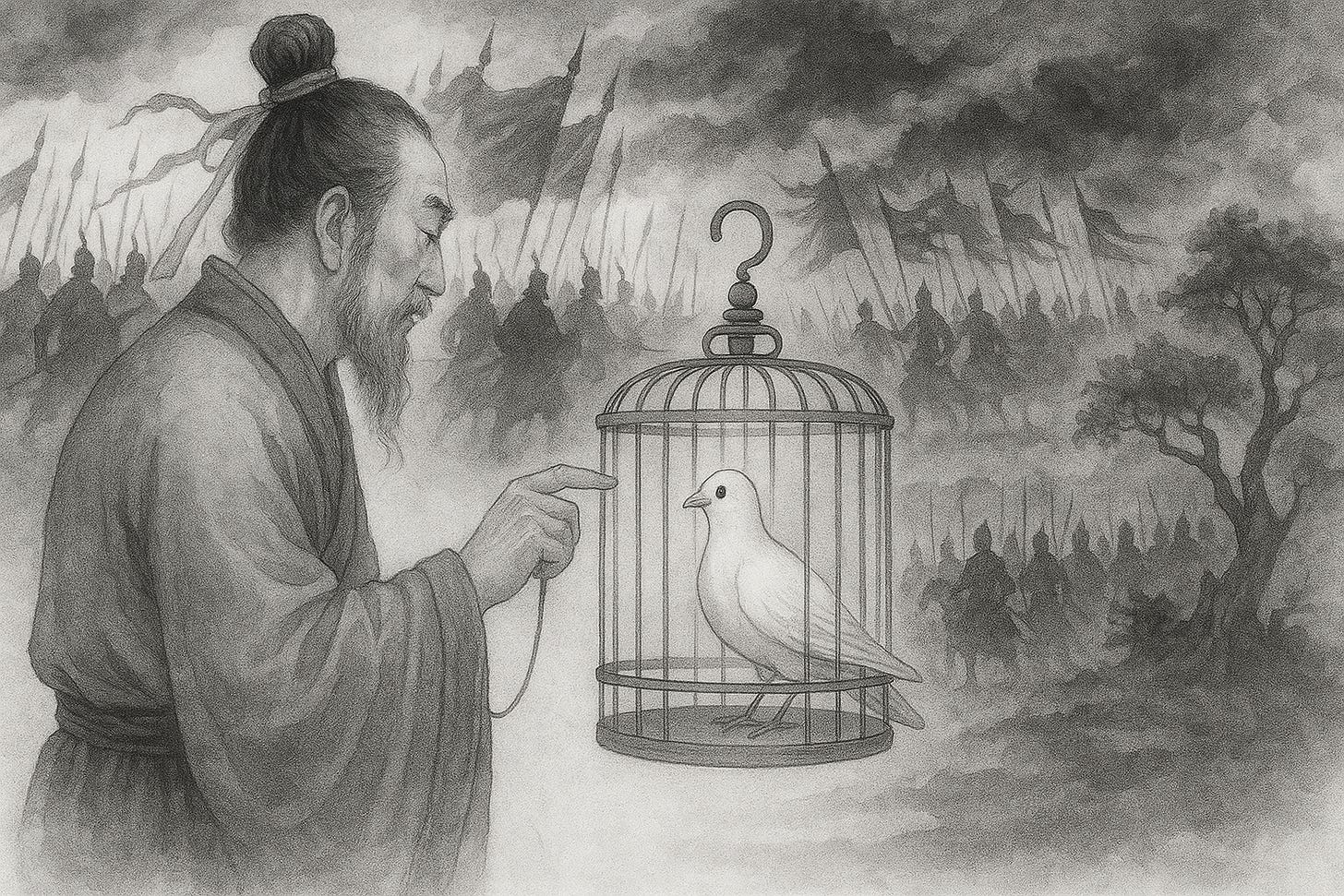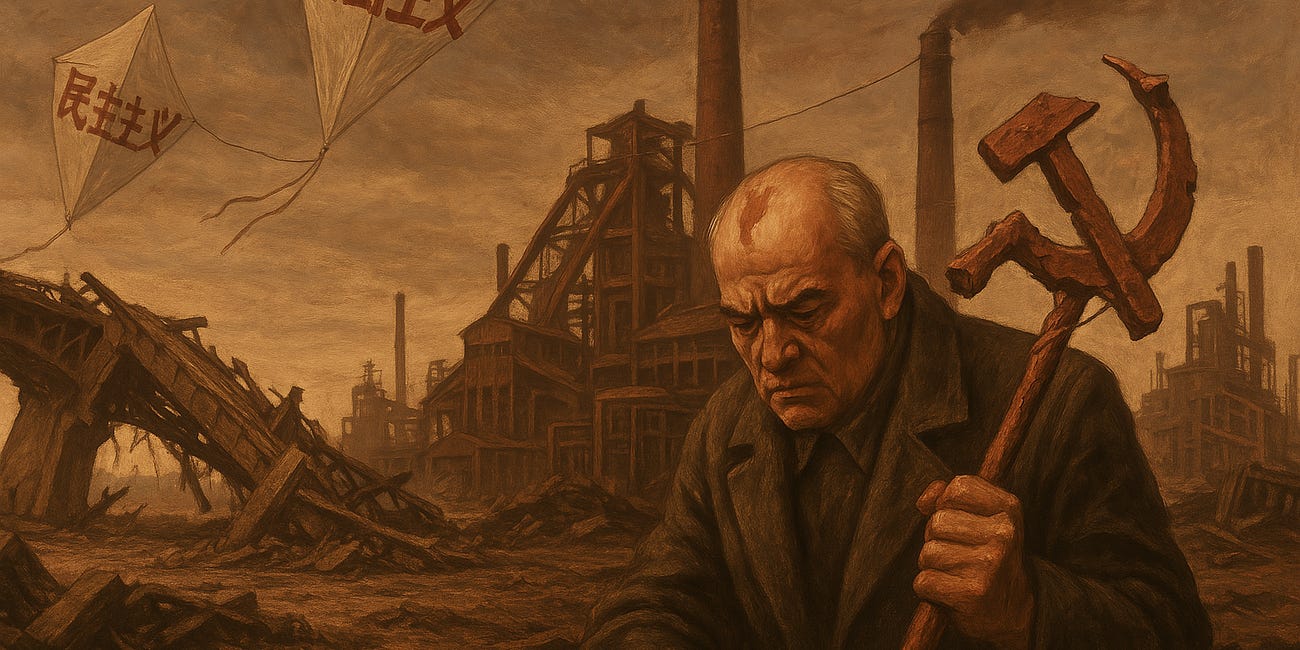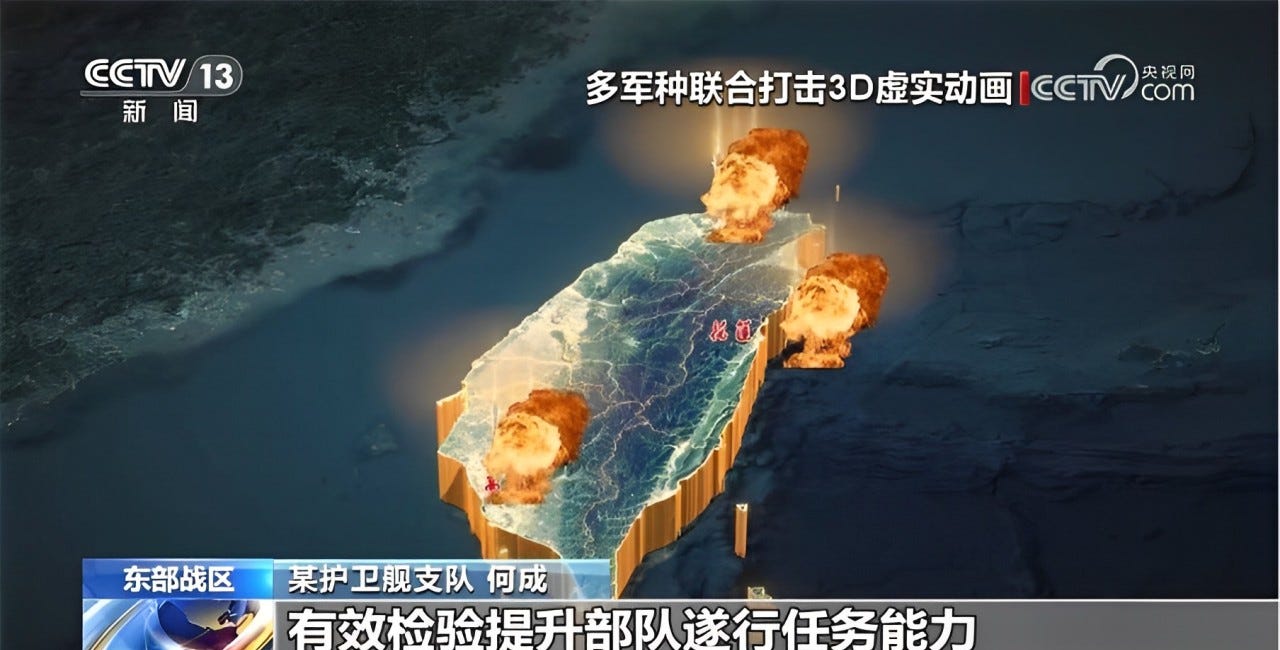Jin Canrong on the "Peace Disease" among China's Elite (Part 1)
"The common people endured repeated humiliation and hardship, while the literati, using the people’s resources to purchase peace, continued to regard themselves as noble and admirable." – Jin Canrong
Today’s edition opens with an introduction by William A. Callahan, Professor of Political Science at Singapore Management University, who was previously Professor of International Relations at the London School of Economics and Political Science (LSE). His research examines the interplay of theory, culture and politics in China and across Asia. Much of his work can be found on his Sensible Politics website. Very grateful to him for his contribution to this newsletter. — Thomas
Jin Canrong is famous in China as a firebrand. As these articles show, Jin enjoys being a “wolf warrior” professor with his strident criticisms of the West and Japan. Considering the political environment in the PRC right now, this is not strange.
What is noteworthy, however, is how Jin’s approach has dramatically changed. Up to the mid-2010s, Jin was known as a liberal, who saw world politics in terms of positive-sum international engagement. Fast-forward to 2025, and he has shifted to a social Darwinist view, that imagines the West as China’s evil essential Other, complete with “piratical culture genes”.
There are many ways to explain Jin’s shift, but the most persuasive is to see it as a reflection of the rise of Xi Jinping. Jin’s writings thus are best appreciated not for their originality, but as a barometer of official views in Beijing: he was an engager when that was mainstream, and now he’s a wolf warrior.
With this in mind, let’s look at Jin’s articles that highlight issues of war and peace. His main point is not just to criticise the West and Japan. Rather, the articles focus on domestic debates, where Jin worries that China’s strategic community and general public don’t properly understand the world and its challenges. To paraphrase John Lennon, Jin tells us that the PRC needs to “give war a chance”, because we live in a hostile global environment.
To an outsider, the idea that China suffers from a “peace disease” and still follows Deng Xiaoping’s “hide your brightness, bide your time” policy seems far-fetched, especially in view of Beijing’s massive military parade in 2025 and the PLA’s daily challenges to Taiwan’s air and sea space.
But again, the value of the articles lies not in their content, but in their position in Chinese strategic debates. Since liberals are scarce in the PRC, Jin is telling other nationalists that they need to be even more strident. He’s also worried about a backlash in China that is not just popular, but populist. That is, the Chinese elite is worried about growing popular resentment that is not just directed externally at the West and Japan, but also internally at the Communist Party.
While many outside China see the PRC as beating the US, Jin’s articles show that inside China the leadership is concerned about a host of economic and political challenges that are breeding instability, which is what the CCP fears the most.
— William A. Callahan
Key Points
An admiration for the Northern Song—which “sought to purchase peace through financial concessions”—among China’s intellectual elite is revealing of their pacifist tendencies and detachment from popular concerns.
The experience of the Song shows that the costs of pacifist avoidance of confrontation are borne by ordinary people, whose resources were expended to purchase peace.
However, China’s strategic community remains captive to the outdated logic of “hiding one’s strength and biding one’s time”, and has yet to respond to the demands of the present.
While the West presents its ideology attractively as a set of “universal values”, its underlying orientation remains one of Darwinist competition and violent plunder shaped by “piratical cultural genes”.
The lofty “global initiatives” announced by China’s leadership remain, for now, a blueprint; only through concrete action can meaningful change be realised in the international arena.
Three-Year Anniversary Special: 12 months for the price of 6.
Exclusively for current subscribers—offer ends in a week.
Support this non-profit newsletter and unlock exclusive content.
Much of the analysis of the 3 September Victory Day military parade by China’s international relations specialists rested on a theoretical conception of the global order that overlooked the necessity of concrete action.
Beyond theoretical abstractions, China’s foreign policy elite must confront the fact that the West still wields decisive global influence and poses a real obstacle to China’s ascent.
Stemming from China’s lack of military experience in recent decades, a “peace disease” is evident not only in Chinese scholarly circles but has even appeared among military figures.
The danger is that China’s elite may credulously fall for Western ideological messaging and, in embracing pacifism, fail to deliver strategic results—thereby forcing ordinary people to bear the costs and forfeiting their trust.
Although public sentiment is turning away from pacifism, the peace “affliction” is still very present; if left unaddressed, the nation could be thrust into peril in the event of a future crisis.
HIDING ONE’S STRENGTH AND BIDING ONE’S TIME IS FINE FOR A SHORT PERIOD, BUT AFTER A WHILE THE PEOPLE WON’T TAKE IT
Jin Canrong (金灿荣)
Published by Jin Canrong’s Public Account (金金乐道编辑部) on 15 September 2025
Translated by Jan Brughmans
(Illustration by OpenAI’s DALL·E 3)
The economic prosperity and elevated status of the literati during the Northern Song have fostered a generally positive perception of the dynasty among China’s [current] intellectual elite [文人]. Nevertheless, the protracted policy of honouring civil officials and denigrating military ones [崇文抑武]—allowing the literati to occupy the dominant position in politics—contributed to a relative weakening of the state’s political resolve [国家政治意志相对薄弱].
When confronted with invasions from the Liao, the Jin and other external powers, the Northern Song often sought to purchase peace through financial concessions, with the Treaty of Chanyuan serving as a prime example of this strategy [Note: 澶渊之盟, a peace treaty signed in AD 1005 between the Northern Song and the Liao Dynasty, whereby the Song acknowledged the loss of the Sixteen Prefectures in Northern China and agreed to disburse annual tribute [岁币] to the nomadic Liao in exchange for peace]. Such peace, however, came at a heavy price, as the burden of tribute ultimately fell upon the common people. In reality, the Northern Song was not lacking in military manpower, nor in capable generals; rather, it was at the strategic level [战略层] that they were not used effectively. As a result, the common people endured repeated humiliation and hardship, while the literati, using the people’s resources to purchase peace, continued to regard themselves as noble and admirable.
Today’s international order contains numerous unjust and unreasonable aspects. This order is dominated by the West and is, in essence, a form of social Darwinism that follows the principle of the strong preying upon the weak and has deep-rooted piratical cultural genes [Note: 海盗文化基因, based on a populist meme that locates the core strand of Western civilisation and its former naval dominance in its pirates and privateers]. The West regards plundering wealth as faster than acquiring it through their own hard work.
Today, China’s strength has already risen up. The 3 September Military Parade demonstrated that we now essentially possess all the military equipment that the United States has, reflecting the strong capabilities of our national defence technology. From this perspective, the [process] of “the East is rising and the West declining” [东升西降] has reached a certain equilibrium. Tackling what lies ahead, however, is a question of mentality and resolve—namely, whether China is prepared to shoulder greater responsibilities on the world stage. Professor Shen Yi has argued that the 3 September Parade represents a sequel to the new world order [国际秩序的续编], with China taking on a larger share of global responsibility [Note: a professor at Fudan University’s School of International Relations and Public Affairs, who in a 3 September article framed the military strength on display as part of a vision for global governance—the fourth addition to Xi’s “global initiatives”]. I, however, am more cautious in my assessment.
At present, a blueprint for a new international order has already taken shape. A representative example is the goal put forward by China’s top leadership of building a community with a shared future for humankind [人类命运共同体], together with the four shared guidelines of the global initiatives on development, security, civilisation and governance [Note: Governance [治理], the fourth of these “global initiatives” [全球倡议], was first raised by Xi at the parade]. More concrete frameworks are embodied in initiatives such as the Belt and Road Initiative. Yet all of these are at an early stage, and it is still uncertain at what point this blueprint may be fully translated into reality.
On the whole, in the face of great changes unseen in a century [百年变局], China’s strategic community has yet to make full psychological preparations. Many continue to favour the idea of “hiding one’s strength and biding one’s time” [韬光养晦], and only emphasise the benefits while overlooking its costs. Benefits do not arise out of thin air; when peace is purchased through concessions, it is ultimately the ordinary people whose interests are sacrificed. Some strategists are even highly self-satisfied [沾沾自喜] with what they regard as enlightened thinking. It must be pointed out, however, that while “hiding one’s strength and biding one’s time” may be effective in the short term, it is unsustainable over the long run. Such a strategy must yield tangible strategic gains; otherwise, prolonged reliance on it will inevitably lead to popular discontent.
Through the sustained efforts of the Chinese people over many years, our national strength has been greatly elevated. The 3 September Parade serves as a concentrated expression of this progress. Yet whether this strength can be effectively harnessed to help build a more just and equitable world order will depend on political resolve and skill. My view is that, at present, China’s strategic community appears to lack such determination and resolve.
THERE IS A DANGEROUS AND TRULY WORRYING TENDENCY WITHIN CHINESE SOCIETY
Jin Canrong (金灿荣)
Published by Jin Canrong’s Public Account (金金乐道编辑部) on 16 September 2025
Translated by Jan Brughmans
Since [our] self-defensive counterattack against Vietnam [Note: 对越自卫反击战, the official framing of the 1979 Sino-Vietnam War], China’s military has virtually fought no major wars. For a great power to achieve its rise without resorting to large-scale conflict is an extraordinary accomplishment—drawing sighs of admiration abroad [外国人都赞叹]. With China accounting for roughly one-fifth of the world’s population, the improvement in the living standards of Chinese people also signifies a step forward for humanity as a whole.
The scholar Zhang Baijia once remarked: “By changing ourselves, we influenced the world” [Note: 改变自己,影响世界, a quote from Zhang, a CCP historian, on the subject of China’s 20th Century developments]. This perspective is particularly insightful. Countries such as Qatar or Luxembourg may enjoy very high per capita GDP, but given their small size, any changes within them will only have a limited impact on the wider world. China, by contrast, is entirely different: as a nation of vast scale, any internal transformation inevitably exerts a major global influence. Overall, China’s reform and opening-up has made a tremendous contribution to global economic development, and its peaceful rise has likewise made an invaluable contribution to world peace.
However, China’s four warless decades have also produced certain negative effects, the most notable being the rise of pan-pacifism [泛和平主义]—or, put more starkly, having caught the “peace disease” [“和平病”]. Many now take peace for granted [将和平视为理所当然], believing that China should unconditionally maintain a state of peace. In his book The Winner’s Mindset [Note: 《胜者思维》, by Jin Yinan, a retired PLA major general and professor at the Department of Strategy and Research, People’s Liberation Army National Defence University], Jin Yinan recalls that, prior to the 2012 Diaoyu Islands [Note: referred to by Japan as the Senkaku Islands] and Huangyan Island [Note: Usually referred to as the Scarborough Shoal] crises, one general even claimed that China no longer had any opponents: neither the US, nor Japan, and nor Taiwan—since it is part of China and as Chinese people, we do not attack other Chinese [中国人不打中国人].
More recently, some have distorted the central government’s Taiwan policy, stressing only “peaceful reunification” and “one country, two systems” [和平统一,一国两制], while ignoring the crucial principle of “never renouncing the use of force” [绝不承诺放弃使用武力]. These phenomena are deeply concerning and bring one to wonder: has pacifism in China become too pronounced?
Peace is the cornerstone of prosperity and development, and China’s growth depends on a peaceful environment; it is for this reason that we attach particular importance to peace. Yet peace is not a gift bestowed [恩赐] by others; it must be secured through strength and relentless struggle [顽强斗争]. The world today is far from tranquil. Sino-American relations have shifted from a dynamic of cooperation amid competition to one of all-consuming competition [全面竞争], giving rise to an increasingly complex situation.
In recent years, both domestic and international opinion have been raising the alarm over the risk of a third world war. If we merely chant slogans of peace while “putting our weapons back in the arsenal and grazing our horses on the hillside” [刀枪入库,马放南山] that would be dangerously naïve. Taken to the extreme, such an attitude amounts to defeatism [投降主义]. Should such thinking permeate the military and dull its vigilance [警惕性被麻痹了], that would be gravely dangerous and the nation would suffer heavy losses. Those who loudly proclaim peace may not harbour ill intentions—indeed, they often feel very pleased with themselves, believing themselves to be rational, neutral and objective [理性、中立、客观]. In reality, however, they are just being used by forces with ulterior motives [别有用心], unwittingly serving as the tools of others.
I have noticed that public opinion in China is, at present, broadly moving in the right direction. Nonetheless, it should be understood that the pan-pacifism accumulated within Chinese society over the past forty years constitutes a serious “affliction” [病症]—one that cannot be reversed overnight. Both the government and the public should respond to this affliction with greater seriousness and put in a proper effort [下大力气] to address it. Otherwise, should a crisis arise before it is treated, China will inevitably suffer heavy losses and its people will be plunged into immense calamity.
The world is complex, and people do not live within the imagined constructs of academic theory. One must take reality as it is [必须从现实出发], rather than acting according to theoretical frameworks. The Chinese Communist Party has, in fact, learned bitter lessons in this regard—the most notable being the “Wang Ming Line” [Note: 王明路线, the position taken by the Moscow-linked CPP leader and rival to Mao, Wang Ming, who advocated for Popular-Front Communism and coordinated defence of cities alongside the Nationalists against the Japanese—rather than Mao’s preferred strategy of establishing separate guerilla base areas]. By placing theory above reality, Wang Ming’s approach led to devastating setbacks for the Red Army, almost losing it entirely. Ultimately, it was Chairman Mao who saved the Red Army. At the most perilous moment, why was it Mao who saved the Party, the Red Army and the Chinese revolution? Precisely because he upheld the principle of seeking truth from facts [实事求是]. I have visited Yuelu Academy [Note: 岳麓书院, associated with the tradition of “practical statecraft” (经世致用) in the late-Qing, which appealed to conservatives and revolutionaries alike] in Hunan many times—the birthplace of the idea of “seeking truth from facts”. Each time I see the plaque inscribed with these words, I am profoundly reminded of the lesson it carries.
Following the “seeking truth from facts” line of thought, one can see that the current international situation is highly perilous. The West still holds a considerable advantage globally, and its piratical culture [海盗文化] of the strong preying upon the weak and survival of the fittest [弱肉强食,适者生存] continues to exert great influence. In reality, the world is far more cruel than the “universal values” [普世价值] packaged up by the West would suggest. If China’s elites were truly to take the bait [上当受骗] and fully adopt pacifism in questions of war and peace, it would represent a grave dereliction of responsibility towards the nation—one that could even prove fatal.
As the ancients said: “However mighty a state may be, a fondness for war will bring ruin; however tranquil the world may appear, to forget war is to invite danger.” [Note: 国虽大,好战必亡;天下虽安,忘战必危, from the Warring States classic, The Methods of the War Minister (《司马法》)] The Chinese nation has endured profound suffering throughout its history, which has fostered both a deep sense of vigilance [忧患意识] and a strong desire for peaceful development. At the same time, we must remain clear-headed: while cherishing [珍视] peace, we must not neglect to strengthen our own capabilities and actively prepare for potential threats. Only in this way can we ensure the nation’s enduring peace and order, and the people’s happiness and well-being.
READ MORE
China's Ukraine Supporters: an "Infantile Disorder" by Zhang Wenmu
Zhang Wenmu (张文木) is a well-known old-school strategist, belonging to the generation of “educated youth” who were sent down to the countryside during the 1970s. Although he presents his views in notably more “red” language, his basic position on Ukraine is similar to that of...
Liberating Taiwan by Force According to Prof. Jin Canrong
Some of you may sigh at the sight of Jin Canrong’s (金灿荣) name. Once better known for his credentials as an international relations scholar, Jin has morphed into one of China’s top public opinion leaders—a lucrative business involving a massive social media following and daily commentaries that help guide Chinese citizens towards views that align with Beijing’s political needs. But beyond the fame and pecuniary benefits that surely come with this role, Jin may well believe that he is acting in his country’s best interest.








